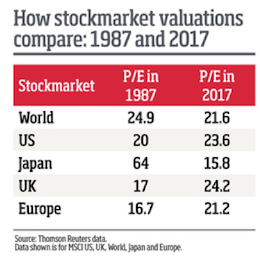Today is the 30th anniversary of Black Monday — the bloodiest day in Wall Street history.
On this fateful day in 1987, the Dow crashed by 22.6%, annihilating the previous one-day record (-12.8%) set on Oct. 28, 1929.
“Appropriately enough, Michael Jackson’s ‘Bad’ topped the U.S. Billboard charts. At the cinema, Fatal Attraction was a box office smash just as investors’ love affair with the stock market, albeit briefly, was about to end.” —Investment Week

When you look at 1987’s pre-crash metrics against today’s, it gets a little scary.
Check out the image to the right to see for yourself.
Of course, the stock market didn’t have “circuit breakers” in place in 1987, which might’ve squelched much of the panic.
Yet still, can we truly justify the hefty valuations of today’s market?
Or is a crash right around the corner?
Here’s what you need to know…
Dealing With a Different Beast
The question is not “if” Black Monday could happen again today. Of course it could.
But it’s important to learn from the mistakes of investors at the time.
Only idiots lost money during Black Monday. By that I mean those who sold directly after the crash.
If you avoided selling into the panic, you could have made out like a bandit.
Indeed, by February 1995, 7½ years after Black Monday, the Dow was at 4,000. That’s almost 50% above its pre-Black Monday peak of 2,722.
And by 2000, the Dow was trading at four times its 1987 peak.
With that said, a crash today would result in longer-term losses. Mainly because of interest rates…
You see, in the ’80s, Paul Volcker kept interest rates extremely high. This depressed earnings, so the market wasn’t especially high before Black Monday hit.
That’s the opposite today. Interest rates have been super low for a decade, so stock market earnings are artificially inflated.
So unlike in 1987, if a Black Monday happens now, you will lose real money. Which means the losses will take longer to reverse.
But low volatility has lulled the market into dangerous complacency.
Eventually, we will see a significant correction — much more than the sub-2% drops we’ve seen so far this year.
And when we do, it could sting a whole lot worse than Black Monday.
Allow me to explain…
Seventy-five percent of market volume is represented by computer-automated trading, according to Reuters.
Why is this important?
Two years after the 1987 crash, “circuit breakers” were installed on the major U.S. stock exchanges to prevent a one-day drop like Black Monday.
As you may know, a circuit breaker is a software safeguard designed to halt trading on issues experiencing sharp intraday drops on heavy volume.
But far more computers — rather than humans — trade shares back and forth than ever before.
So when the selling hits, the circuit breakers will certainly pause trades.
But as soon as the lights come back on, network computers will resume their frantic selling.
Worse still, if the markets get rocked hard enough, stocks could go completely without bids as automated-trading computers refuse to buy.
We have seen both happen in 2015 during the August “flash crash.”
How can investors protect themselves from getting whipsawed?
With the strategic use of stop losses and keeping a close eye on the markets.
Just Don’t Be an Idiot
History is our best teacher. Markets might sell off lightning fast, but they don’t keep plummeting. They find a bottom quickly.
Consequently, as Martin pointed out, only idiots lose money in the throes of a crash. And that’s because they defy all logic and sell in a panic.
Panic selling is not an exit strategy. Moreover, it never leads to more profits.
So whether you fear a major crash is right around the corner or far off… and a subsequent recovery would be swift or a long time coming… the appropriate response is the same.
You should position size and use trailing stops. If they get triggered, look to reinvest when the panic subsides.
If they don’t get triggered, hang tight. The market’s long-term trajectory is still going to be up and to the right. So a little patience, not panic, will always increase your bottom line.
Ahead of the tape,
